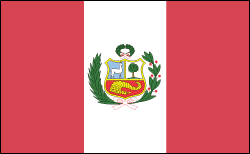- / Countries of the World
- / history
Peru History

Index
- Peru Profile
- History
- News and Current Events
A New Era of Government
Peru's fragile democracy survived. In 1985, Belaúnde Terry was the first elected president to turn over power to a constitutionally elected successor since 1945. Alberto Fujimori won the 1990 elections. Citing continuing terrorism, drug trafficking, and corruption, Fujimori dissolved Congress, suspended the constitution, and imposed censorship in April 1992. By September, all but Shining Path had been vanquished. A new constitution was approved in 1993.
Fujimori was reelected in 1995 and again in May 2000 to a third five-year term, after his opponent, Alejandro Toledo, withdrew from the contest, charging fraud. In Sept. 2000, Fujimori's intelligence chief, Vladimiro Montesinos, was videotaped bribing a congressman. Fujimori announced he would dismantle the powerful National Intelligence Service, which has been accused of human rights violations. Two months later, he stunned his nation by resigning during a trip to Japan. Revelations that Fujimori secretly held Japanese citizenship—and could not be extradited to face corruption charges—enraged the populace.
In 2001, the centrist Alejandro Toledo was elected president with 53% of the vote, narrowly defeating former president Alan García. His rags-to-riches story and mixed Indian and Latino heritage made him popular among the poor. Inheriting a country racked by economic troubles and corruption, Toledo did little, however, to restore confidence in the government. Early in his presidency, he gave himself a significant pay raise while at the same time calling for economic austerity. In June 2002, a popular revolt took place in the cities of Arequipa and Tacna and in other areas of southern Peru after the sale of two state-run electricity firms to a Belgian company, Tractebel. Toledo had specifically promised during his campaign not to sell these firms. Opinion polls at the time indicated that more than 60% of Peruvians were adamantly opposed to privatization and foreign investment, which in the past had led to price increases, mass layoffs, corruption, and few discernible benefits for the populace. A series of scandals and political missteps between 2003 and 2005 caused Toledo's approval ratings to plummet, at one point as low as 8%.
